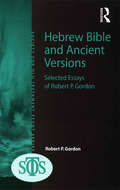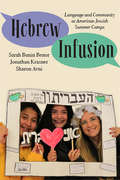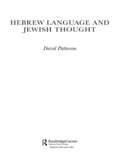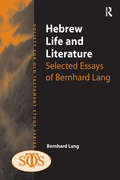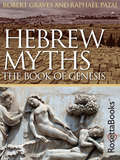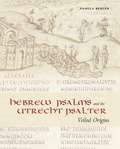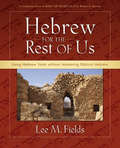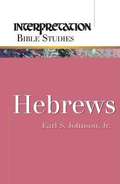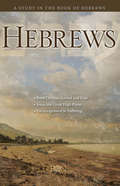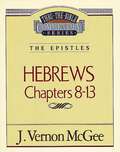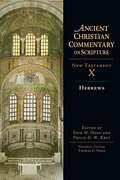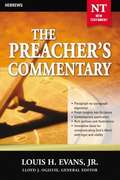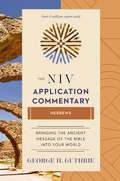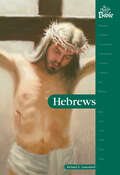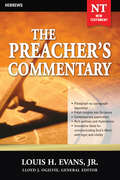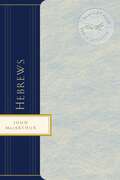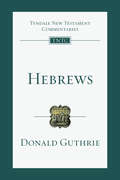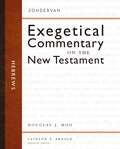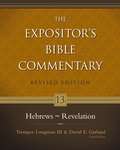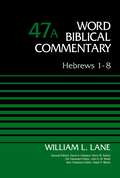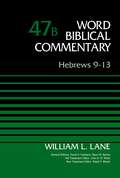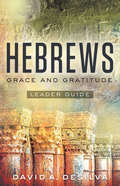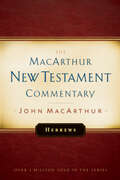- Table View
- List View
Hebrew Bible and Ancient Versions: Selected Essays of Robert P. Gordon (Society For Old Testament Study Ser.)
by Robert P. GordonRobert Gordon gathers together his most important essays on the Old Testament and on the ancient versions, adding an introduction which gives background comment and reflections on each essay. The Old Testament essays are divided into three groups: The Narrative Tradition', 'Prophecy from East to West', and 'Across, Behind and Beyond the Text'. The essays on the ancient versions are divided into two sections: 'The Text and the Versions' and 'The Targums, Chiefly to the Prophets'.
Hebrew Infusion: Language and Community at American Jewish Summer Camps
by Sarah Bunin Benor Jonathan Krasner Sharon AvniEach summer, tens of thousands of American Jews attend residential camps, where they may see Hebrew signs, sing and dance to Hebrew songs, and hear a camp-specific hybrid language register called Camp Hebraized English, as in: “Let’s hear some ruach (spirit) in this chadar ochel (dining hall)!” Using historical and sociolinguistic methods, this book explains how camp directors and staff came to infuse Hebrew in creative ways and how their rationales and practices have evolved from the early 20th century to today. Some Jewish leaders worry that Camp Hebraized English impedes Hebrew acquisition, while others recognize its power to strengthen campers’ bonds with Israel, Judaism, and the Jewish people. Hebrew Infusion explores these conflicting ideologies, showing how hybrid language can serve a formative role in fostering religious, diasporic communities. The insightful analysis and engaging descriptions of camp life will appeal to anyone interested in language, education, or American Jewish culture.
Hebrew Language and Jewish Thought (Routledge Jewish Studies Series)
by David PattersonDrawing on more than three hundred Hebrew roots, the author shows that Jewish thought employs Hebrew concepts and categories that are altogether distinct from those that characterize the Western speculative tradition. Among the key categories that shape Jewish thought are holiness, divinity, humanity, prayer, responsibility, exile, dwelling, gratitude, and language itself. While the Hebrew language is central to the investigation, the reader need not have a knowledge of Hebrew in order to follow it. Essential reading for students and scholars of Judaism, this book will also be of value to anyone interested in the categories of thinking that form humanity's ultimate concerns.
Hebrew Life and Literature: Selected Essays of Bernhard Lang (Society for Old Testament Study)
by Bernhard LangBernhard Lang, known for his contributions over several decades to biblical anthropology, offers in this volume a selection of essays on the life and literature of the ancient Hebrews. The subjects range from the Hebrew God, the world-view of the Bible, and the formation of the scriptural canon, to peasant poverty, women's work, the good life, and prophetic street theatre. The stories of Joseph, Samson, and the expulsion from Paradise are analysed, and in a departure from the Old Testament, the priestly origins of the Eucharist are considered. Insight into the Hebrew mentality is facilitated by the arrangement of the essays, reflecting the three strata of the ancient society: the peasants, with their common concerns of fertility and happiness; warriors, their martial pursuits, and the divine Lord of War; and the wise - prophets, priests, and sages.
Hebrew Myths: The Book of Genesis
by Robert Graves Raphael PataiThe I, Claudius author&’s &“lightning sharp interpretations and insights . . . are here brought to bear with equal effectiveness on the Book of Genesis&” (Kirkus Reviews). This is a comprehensive look at the stories that make up the Old Testament and the Jewish religion, including the folk tales, apocryphal texts, midrashes, and other little-known documents that the Old Testament and the Torah do not include. In this exhaustive study, Robert Graves provides a fascinating account of pre-Biblical texts that have been censored, suppressed, and hidden for centuries, and which now emerge to give us a clearer view of Hebrew myth and religion than ever. Venerable classicist and historian Robert Graves recounts the ancient Hebrew stories, both obscure and familiar, with a rich sense of storytelling, culture, and spirituality. This book is sure to be riveting to students of Jewish or Judeo-Christian history, culture, and religion.
Hebrew Psalms and the Utrecht Psalter: Veiled Origins
by Pamela BergerIn a major departure from previous scholarship, this volume argues that the illustrations in the famous and widely influential Utrecht Psalter manuscript were inspired by a late antique Hebrew version of Psalms, rather than a Latin, Christian version of the text.Produced during the early ninth century in a workshop near Reims, France, the Utrecht Psalter is illustrated with pen-and-ink drawings in a lively style reminiscent of Hellenistic art. The motifs are largely literal renditions of words and phrases found in the book of Psalms. However, more than three dozen motifs cannot be explained by either the Latin text that accompanies the imagery or the commentaries of the church fathers. Through a close reading of the Hebrew Psalms, Pamela Berger demonstrates that these motifs can be explained only by the Hebrew text, the Jewish commentary, or Jewish art. Drawing comparisons between the "Hellenistic" style of the Psalter images and the style of late antique Galilean mosaics and using evidence from recent archaeological discoveries, Berger argues that the model for those Psalter illustrations dependent on the Hebrew text was produced in the Galilee.Pioneering and highly persuasive, this book resolves outstanding issues surrounding the origins of one of the most extensively studied illuminated manuscripts. It will be mandatory reading for many historians of medieval art and literature and for those interested in the Hebrew text of the book of Psalms.
Hebrew Psalms and the Utrecht Psalter: Veiled Origins
by Pamela BergerIn a major departure from previous scholarship, this volume argues that the illustrations in the famous and widely influential Utrecht Psalter manuscript were inspired by a late antique Hebrew version of Psalms, rather than a Latin, Christian version of the text.Produced during the early ninth century in a workshop near Reims, France, the Utrecht Psalter is illustrated with pen-and-ink drawings in a lively style reminiscent of Hellenistic art. The motifs are largely literal renditions of words and phrases found in the book of Psalms. However, more than three dozen motifs cannot be explained by either the Latin text that accompanies the imagery or the commentaries of the church fathers. Through a close reading of the Hebrew Psalms, Pamela Berger demonstrates that these motifs can be explained only by the Hebrew text, the Jewish commentary, or Jewish art. Drawing comparisons between the “Hellenistic” style of the Psalter images and the style of late antique Galilean mosaics and using evidence from recent archaeological discoveries, Berger argues that the model for those Psalter illustrations dependent on the Hebrew text was produced in the Galilee.Pioneering and highly persuasive, this book resolves outstanding issues surrounding the origins of one of the most extensively studied illuminated manuscripts. It will be mandatory reading for many historians of medieval art and literature and for those interested in the Hebrew text of the book of Psalms.
Hebrew for the Rest of Us: Using Hebrew Tools without Mastering Biblical Hebrew
by Lee M. FieldsThis is a companion volume to Greek for the Rest of Us by William D. Mounce. This book is a guide for English-only readers to understand the language of the Old Testament just enough to work with the Old Testament in more detail and to understand the scholarly literature on the Hebrew Bible. Its specific aims are to aid students to learn (1) why translations differ, (2) how to do Hebrew word studies, (3) what the basics of Hebrew exegesis are, and (4) how to read more advanced Old Testament commentaries with greater understanding. Herbrew for the Rest of Us is set up in a workbook format.
Hebrews
by Earl S. JohnsonIn this volume pastor and scholar Earl Johnson, Jr. , discusses how the book of Hebrews encouraged people to remain faithful through its claims that Jesus was the true and final revelation of God, God's eternal priest who was superior to the prophets of the Old Testament, and the way to our salvation--three truths that still exist for Christians today. Interpretation Bible Studies (IBS) offers solid biblical content in a creative study format. Forged in the tradition of the celebrated Interpretation commentary series, IBS makes the same depth of biblical insight available in a dynamic, flexible, and user-friendly resource. Designed for adults and older youth, IBS can be used in small groups, in church school classes, in large group presentations, or in personal study.
Hebrews
by Rose PublishingFind out how to persevere, remain faithful, and live a life that glorifies God with this incredible in-depth Bible study on Hebrews. See how the early church withstood intense persecution and experience the peace that comes from recognizing Christ as our perfect High Priest. Includes section-by-section commentary, quick-reference charts, and simple summaries!Hebrews was written during a time of intense persecution against Christians in the Roman Empire. During that time, believers needed encouragement to follow Christ-- just as we do today. By showing Jesus' superiority to the Old Covenant, the letter encourages believers (then and now) to be faithful to Jesus even during the toughest of times! Enjoy having a fantastic overview on the entire book of Hebrews at your fingertips--get incredible insight into Jesus' superiority to the old covenant and be encouraged by 15 heroes of our faith who resisted the urge to give up and stood firmly in their faith! Perfect for individual use, group Bible studies, Sunday School, etc. Use it as a stand-alone study or use it to add depth to any Old or New Testament study. (Click on any of these key features to learn more about them)* Includes a Fantastic Outline and Overview of the Book of Hebrews* Emphasizes the Superiority of Christ! Covers the 5 Ways Christ is Superior to the Old Covenant (greater than Moses, Melchizedek, Old Testament High Priests, and the Tabernacle)!* Highlights the 15 Heroes of Faith from Hebrews 11, including Enoch, Noah, Abraham, Gideon, Rahab, and more!* Features 5 incredible charts that show tons of information at a glance* Shares 11 practical ways to stand firm in your faith and live a Christian life.
Hebrews II: Hebrews, Chapters 8-13 (Thru the Bible #52)
by Vernon McgeeRadio messages from J. Vernon McGee delighted and enthralled listeners for years with simple, straightforward language and clear understanding of the Scripture. Now enjoy his personable, yet scholarly, style in a 60-volume set of commentaries that takes you from Genesis to Revelation with new understanding and insight. Each volume includes introductory sections, detailed outlines and a thorough, paragraph-by-paragraph discussion of the text. A great choice for pastors - and even better choice for the average Bible reader and student! Very affordable in a size that can go anywhere, it's available as a complete 60-volume series, in Old Testament or New Testament sets, or individually.
Hebrews (Ancient Christian Commentary on Scripture #10)
by Erik M. Heen Philip D. W. KreyDistinctive in form, content and style, the epistle to the Hebrews offers a profound high Christology and makes an awe-inspiring contribution to our understanding of Jesus as our High Priest. The earliest extant commentary on the letter comes to us in thirty-four homilies from John Chrysostom. These homilies serve to anchor the excerpts chosen by the editors of this volume because of their unique place in the history of interpretation. In addition to being the first comprehensive commentary on the letter, they deeply influenced subsequent interpretation in both the East and the West, and their rhetorical eloquence has long been acknowledged. As in other Ancient Christian Commentary volumes, the excerpts chosen range widely over geography and time from Justin Martyr and Clement of Rome in the late first and early second century to The Venerable Bede, Isaac of Nineveh, Photius and John of Damascus in the eighth and ninth centuries. The Alexandrian tradition is well represented in Clement of Alexandria, Origen, Athanasius, Didymus and Cyril of Alexandria, while the Antiochene tradition is represented in Ephrem the Syrian, Theodore of Mopsuestia, Severian of Gabala and Theodoret of Cyr. Italy and North Africa in the West are represented by Ambrose, Cassiodorus and Augustine, while Constantinople, Asia Minor and Jerusalem in the East are represented by the Great Cappadocians--Basil the Great, Gregory of Nazianzus and Gregory of Nyssa--Eusebius, Cyril of Jerusalem and Jerome. Edited by Erik M. Heen and Philip D. W. Krey, this volume offers a rich treasure of ancient wisdom from Hebrews for the enrichment of the church today.
Hebrews (Preacher's Commentary, Volume #33)
by Louis H. EvansGeneral editor Lloyd J. Ogilvie brings together a team of skilled and exceptional communicators to blend sound scholarship with life-related illustrations. The design for the Preacher's Commentary gives the reader an overall outline of each book of the Bible. Following the introduction, which reveals the author's approach and salient background on the book, each chapter of the commentary provides the Scripture to be exposited. The New King James Bible has been chosen for the Preacher's Commentary because it combines with integrity the beauty of language, underlying Hebrew and Greek textual basis, and thought-flow of the 1611 King James Version, while replacing obsolete verb forms and other archaisms with their everyday contemporary counterparts for greater readability. Reverence for God is preserved in the capitalization of all pronouns referring to the Father, Son, or Holy Spirit. Readers who are more comfortable with another translation can readily find the parallel passage by means of the chapter and verse reference at the end of each passage being exposited. The paragraphs of exposition combine fresh insights to the Scripture, application, rich illustrative material, and innovative ways of utilizing the vibrant truth for his or her own life and for the challenge of communicating it with vigor and vitality.
Hebrews (The NIV Application Commentary)
by George H. GuthrieThe NIV Application Commentary helps you communicate and apply biblical text effectively in today's context.To bring the ancient messages of the Bible into today's world, each passage is treated in three sections:Original Meaning. Concise exegesis to help readers understand the original meaning of the biblical text in its historical, literary, and cultural context.Bridging Contexts. A bridge between the world of the Bible and the world of today, built by discerning what is timeless in the timely pages of the Bible.Contemporary Significance. This section identifies comparable situations to those faced in the Bible and explores relevant application of the biblical messages. The author alerts the readers of problems they may encounter when seeking to apply the passage and helps them think through the issues involved.This unique, award-winning commentary is the ideal resource for today's preachers, teachers, and serious students of the Bible, giving them the tools, ideas, and insights they need to communicate God's Word with the same powerful impact it had when it was first written.
Hebrews (The People's Bible)
by Richard E LauersdorfWhat is the book of Hebrews about in the Bible? Who wrote Hebrews?Though no author is identified in the letter itself, the letter to the Hebrews asserts that God made his final and complete revelation to humanity through Jesus Christ. The letter provides a bridge between the Old and New Testaments, maintains that Jesus is greater than the Old Covenant, and encourages Christians to persevere in spite of their trials and temptations.Want to learn more? If you’re wondering what the book of Hebrews is all about, this helpful resource is for you!Hebrews is a reliable Bible commentary. It’s down to earth, clearly written, easy to read and understand, and filled with practical and modern applications to Scripture.It also includes the complete text of the book of Hebrews from the NIV Bible. The Christ-centered commentaries following the Scripture sections contain explanations of the text, historical background, illustrations, and archaeological information. Hebrews is a great resource for personal or group study!This book is a part of The People’s Bible series from Northwestern Publishing House.
Hebrews (The Preacher's Commentary #33)
by Louis EvansGeneral editor Lloyd J. Ogilvie brings together a team of skilled and exceptional communicators to blend sound scholarship with life-related illustrations.The design for the Preacher's Commentary gives the reader an overall outline of each book of the Bible. Following the introduction, which reveals the author's approach and salient background on the book, each chapter of the commentary provides the Scripture to be exposited. The New King James Bible has been chosen for the Preacher's Commentary because it combines with integrity the beauty of language, underlying Hebrew and Greek textual basis, and thought-flow of the 1611 King James Version, while replacing obsolete verb forms and other archaisms with their everyday contemporary counterparts for greater readability. Reverence for God is preserved in the capitalization of all pronouns referring to the Father, Son, or Holy Spirit. Readers who are more comfortable with another translation can readily find the parallel passage by means of the chapter and verse reference at the end of each passage being exposited. The paragraphs of exposition combine fresh insights to the Scripture, application, rich illustrative material, and innovative ways of utilizing the vibrant truth for his or her own life and for the challenge of communicating it with vigor and vitality.
Hebrews (The Preacher's Commentary)
by John MacarthurThese study guides, part of a 16-volumne set from noted Bible scholar John MacArthur, take readers on a journey through biblical texts to discover what lies beneath the surface, focusing on meaning and context, and then reflection on the explored passage or concept. With probing questions that guide the reader toward application, as well as ample space for journaling, The MacArthur Bible Studies are invaluable tools for Bible students of all ages.
Hebrews (Tyndale New Testament Commentaries #Volume 15)
by Donald GuthrieThe book of Hebrews is quite challenging, claims commentary author Donald Guthrie, since there are many open questions about authorship, historical setting and audience. More than most New Testament books, Hebrews requires detailed explanations of the background allusions within it, which reference the priesthood of Christ being directly linked to the old Levitical order. Above all, Hebrews deals with the important question, How can we approach God? The Tyndale New Testament Commentaries have long been a trusted resource for Bible study. Written by some of the world's most distinguished evangelical scholars, these twenty volumes offer clear, reliable, and relevant explanations of every book in the New Testament. The original, unrevised text of this volume has been completely retypeset and printed in a larger, more attractive format with the new cover design for the series. These Tyndale volumes are designed to help readers understand what the Bible actually says and what it means. The introduction to each volume gives a concise but thorough description of the authorship, date, and historical background of the biblical book under consideration. The commentary itself examines the text section by section, drawing out its main themes. It also comments on individual verses and deals with problems of interpretation. The aim throughout is to get at the true meaning of the Bible and to make its message plain to readers today.
Hebrews (Zondervan Exegetical Commentary on the New Testament)
by Douglas J. MooDesigned for the pastor and Bible teacher, the Zondervan Exegetical Commentary on the New Testament features today's top New Testament scholars and brings together commentary features rarely gathered together in one volume. With careful analysis and interpretation of the Greek text, the authors trace the flow of argument in each New Testament book, giving readers the tools they need to properly understand and communicate the meaning of the text.?Commentary on each passage follows a clear structure to help readers grasp the flow and meaning of the text:?Literary Context: A brief discussion of how the passage functions in the broader literary context of the book.?Main Idea: A one- or two-sentence statement of the big idea or central thrust of the passage.?Translation and Graphical Layout: Presents each commentator's translation of the Greek text in a graphical layout to help the reader visualize, and thus better understand, the flow of thought within the text.?Structure: Describes the flow of thought in the passage and explains how certain interpretive decisions regarding the relationship of the clauses were made in the passage.?Exegetical Outline: The overall structure of the passage is described in a detailed exegetical outline. This will be particularly helpful for those who are looking for a way to concisely explain the flow of thought in the passage in a teaching or preaching setting.?Explanation of the Text: Commentators examine words and images, grammatical details, relevant Old Testament and Jewish background to a particular concept, historical and cultural context, important text-critical issues, and various interpretive issues that surface.?Theology in Application: The theological message of the passage is summarized. The author discusses the theology of the text in terms of its place within the book and in a broader biblical-theological context. Finally, each commentator provides some suggestions on what the message of the passage is for the church today.?The Zondervan Exegetical Commentary on the New Testament series is the go-to resource for pastors and Bible teachers looking for deep but accessible study that equips them to connect the needs of Christians today with the biblical text.
Hebrews - Revelation (The Expositor's Bible Commentary)
by Tremper Longman III David E. GarlandContinuing a Gold Medallion Award-winning legacy, this completely revised edition of The Expositor’s Bible Commentary series puts world-class biblical scholarship in your hands. Based on the original twelve-volume set that has become a staple in college and seminary libraries and pastors’ studies worldwide, this new thirteen-volume edition marshals the most current evangelical scholarship and resources. You’ll find up-to-date information grounded in the same unchanging commitment to the divine inspiration, complete trustworthiness, and full authority of the Bible. Of the fifty-six contributors, thirty of them are new. Reflecting the Expositor’s Bible Commentary international and cross-denominational approach, they come from the United States, Canada, England, Scotland, Australia, and New Zealand, and from a broad diversity of churches, including Anglican, Baptist, Brethren, Methodist, Nazarene, Presbyterian, and Reformed. The Expositor’s Bible Commentary uses the complete New International Version for its English text, but it also refers freely to other translations and to the original languages. For each book of the Bible, the thoroughly revised features consist of: A comprehensive introduction A short and precise bibliography A detailed outline Insightful exposition of passages and verses Overviews of sections of Scripture to illumine the big picture Occasional reflections to give more detail on important issues Notes on textual questions and special problems, placed close to the text in question Transliteration and translation of Hebrew and Greek words, enabling readers to understand even the more technical notes A balanced and respectful approach toward marked differences of opinion
Hebrews 1-8, Volume 47A (Word Biblical Commentary)
by William L. Lane Ralph P. Martin David Allen Hubbard Glenn W. Barker John D. WattsThe Word Biblical Commentary delivers the best in biblical scholarship, from the leading scholars of our day who share a commitment to Scripture as divine revelation. This series emphasizes a thorough analysis of textual, linguistic, structural, and theological evidence. The result is judicious and balanced insight into the meanings of the text in the framework of biblical theology. These widely acclaimed commentaries serve as exceptional resources for the professional theologian and instructor, the seminary or university student, the working minister, and everyone concerned with building theological understanding from a solid base of biblical scholarship.Overview of Commentary OrganizationIntroduction—covers issues pertaining to the whole book, including context, date, authorship, composition, interpretive issues, purpose, and theology.Each section of the commentary includes:Pericope Bibliography—a helpful resource containing the most important works that pertain to each particular pericope.Translation—the author’s own translation of the biblical text, reflecting the end result of exegesis and attending to Hebrew and Greek idiomatic usage of words, phrases, and tenses, yet in reasonably good English.Notes—the author’s notes to the translation that address any textual variants, grammatical forms, syntactical constructions, basic meanings of words, and problems of translation.Form/Structure/Setting—a discussion of redaction, genre, sources, and tradition as they concern the origin of the pericope, its canonical form, and its relation to the biblical and extra-biblical contexts in order to illuminate the structure and character of the pericope. Rhetorical or compositional features important to understanding the passage are also introduced here.Comment—verse-by-verse interpretation of the text and dialogue with other interpreters, engaging with current opinion and scholarly research.Explanation—brings together all the results of the discussion in previous sections to expose the meaning and intention of the text at several levels: (1) within the context of the book itself; (2) its meaning in the OT or NT; (3) its place in the entire canon; (4) theological relevance to broader OT or NT issues.General Bibliography—occurring at the end of each volume, this extensive bibliographycontains all sources used anywhere in the commentary.
Hebrews 9-13, Volume 47B (Word Biblical Commentary)
by William L. Lane Ralph P. Martin David Allen Hubbard Glenn W. Barker John D. WattsThe Word Biblical Commentary delivers the best in biblical scholarship, from the leading scholars of our day who share a commitment to Scripture as divine revelation. This series emphasizes a thorough analysis of textual, linguistic, structural, and theological evidence. The result is judicious and balanced insight into the meanings of the text in the framework of biblical theology. These widely acclaimed commentaries serve as exceptional resources for the professional theologian and instructor, the seminary or university student, the working minister, and everyone concerned with building theological understanding from a solid base of biblical scholarship.Overview of Commentary OrganizationIntroduction—covers issues pertaining to the whole book, including context, date, authorship, composition, interpretive issues, purpose, and theology.Each section of the commentary includes:Pericope Bibliography—a helpful resource containing the most important works that pertain to each particular pericope.Translation—the author’s own translation of the biblical text, reflecting the end result of exegesis and attending to Hebrew and Greek idiomatic usage of words, phrases, and tenses, yet in reasonably good English.Notes—the author’s notes to the translation that address any textual variants, grammatical forms, syntactical constructions, basic meanings of words, and problems of translation.Form/Structure/Setting—a discussion of redaction, genre, sources, and tradition as they concern the origin of the pericope, its canonical form, and its relation to the biblical and extra-biblical contexts in order to illuminate the structure and character of the pericope. Rhetorical or compositional features important to understanding the passage are also introduced here.Comment—verse-by-verse interpretation of the text and dialogue with other interpreters, engaging with current opinion and scholarly research.Explanation—brings together all the results of the discussion in previous sections to expose the meaning and intention of the text at several levels: (1) within the context of the book itself; (2) its meaning in the OT or NT; (3) its place in the entire canon; (4) theological relevance to broader OT or NT issues.General Bibliography—occurring at the end of each volume, this extensive bibliographycontains all sources used anywhere in the commentary.
Hebrews Leader Guide: Grace and Gratitude (Hebrews)
by David A. deSilvaThe Book of Hebrews helps us see the connection between God’s grace in our lives and the call to invest ourselves in God’s mission in the world. In doing so, we express gratitude for the salvation we have received and respond to God’s grace by being faithful to the One who delivers us.In Hebrews: Grace and Gratitude, author and New Testament scholar David deSilva takes you through a study of Hebrews, tracing the themes of grace and gratitude through this unique New Testament book. In the Book of Hebrews, you will discover a bold perspective on who Jesus is and what he has done, as well as a powerful reflection on the meaning and significance of his death and resurrection in light of the Old Testament. As you read and study this letter, you will receive a deeper appreciation for the salvation we have received through Christ and hear afresh God’s call to a life of gratitude and faithfulness.The Leader Guide contains everything needed to guide a group through the six-week study including session plans, activities, and discussion questions, as well as multiple format options.
Hebrews MacArthur New Testament Commentary: Christ: Perfect Sacrifice, Perfect Priest (MacArthur New Testament Commentary Series)
by John MacArthurThese commentaries, part of a set from noted Bible scholar John MacArthur, take readers on a journey through biblical texts to discover what lies beneath the surface, focusing on meaning and context, and then reflecting on the explored passage or concept. With probing questions that guide the reader toward application, as well as ample space for journaling, The MacArthur New Testament Commentaries are invaluable tools for Bible students of all ages.This work on Hebrews is part of a New Testament commentary series which has as its objective explaining and applying Scripture, focusing on the major doctrines and how they relate to the whole of the Bible.
Hebrews MacArthur New Testament Commentary: Christ: Perfect Sacrifice, Perfect Priest (MacArthur New Testament Commentary Series)
by John MacArthurThese commentaries, part of a set from noted Bible scholar John MacArthur, take readers on a journey through biblical texts to discover what lies beneath the surface, focusing on meaning and context, and then reflecting on the explored passage or concept. With probing questions that guide the reader toward application, as well as ample space for journaling, The MacArthur New Testament Commentaries are invaluable tools for Bible students of all ages.This work on Hebrews is part of a New Testament commentary series which has as its objective explaining and applying Scripture, focusing on the major doctrines and how they relate to the whole of the Bible.
